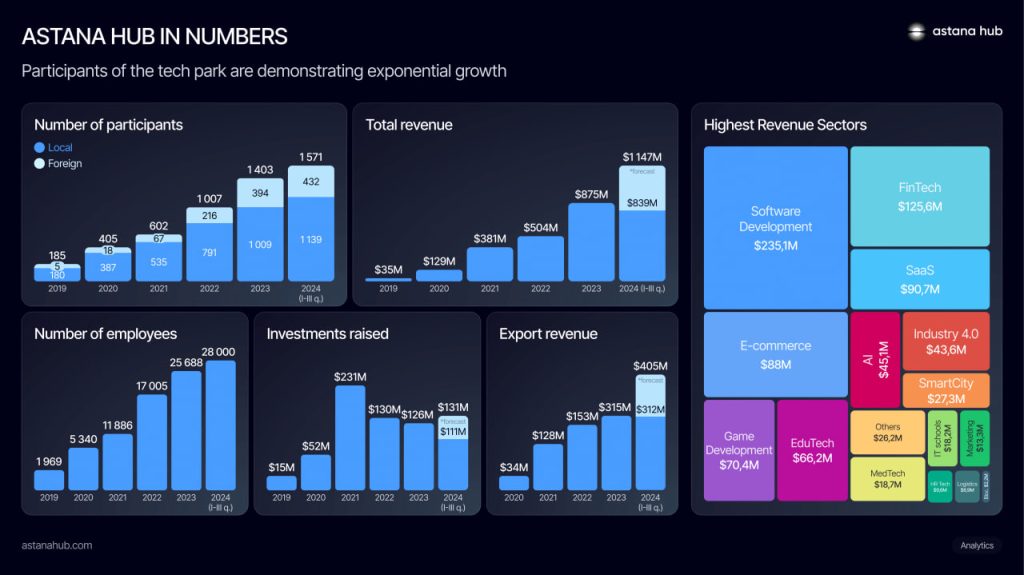
Astana Hub, the largest international technology park in Central Asia, has been a catalyst for the development of the IT industry and innovation in the region for six years. Since its official launch on November 6, 2018, the technology park has been actively developing the ecosystem and supporting startups, striving to create conditions for economic growth and technological progress of the country. Thanks to the support of the Head of State and the Government of Kazakhstan, in particular the Ministry of Digital Development, Innovation and Aerospace Industry of the Republic of Kazakhstan, as well as strategic partners, Astana Hub has achieved significant results in the development of an ecosystem for technological business.
Ecosystem and infrastructure: Since 2018, the number of participants in the technology park has grown from 185 to 1,571 companies, including more than 430 participants with foreign participation. The number of jobs created by the participants of the technology park exceeded 28 thousand. Astana Hub provides startups with access to tax benefits, simplified labor and visa regimes, office and residential premises, which contributes to the active development of the IT community of Kazakhstan. The infrastructure of the technology park is home to the offices of large international companies such as Playrix, TikTok, inDrive, EPAM, Glovo, DAMUMED, Presight.ai, and others.
Revenue and export growth: The total revenue of the technology park’s residents since its launch has amounted to $1.9 billion, starting from $35 million in 2019 and reaching $875 million by 2023, with a forecast for 2024 of $1,147 million. The export of services by Astana Hub participants also demonstrates rapid growth: over the past four years, revenue has amounted to $630 million, and taking into account the results of 2024, it is expected that the total IT exports of participants over five years will exceed $1 billion.
Attracting investment: Over six years, Astana Hub startups have attracted $665.5 million, which has significantly strengthened the Kazakhstani IT ecosystem and brought projects to the international level. Promising startups successfully scaling to international markets include CerebraAI, CodiPlay, Parqour, ApartX, Kwaka, Biometric, Beksar, Alaqan, Zypl.ai, ZebraEye, Arlan Biotech, and others.
Key startup support programs: Astana Hub supports startups at all stages of development through the Scalerator, Techpreneurs, Startup Garage, and Global Outsourcer programs. Among the flagship accelerators is Silkway Accelerator, developed jointly with Google for Startups, which helps startups enter international markets. Out of more than 1,300 applications, 62 startups from Central Eurasia have successfully completed it, reaching a total capitalization of $430 million and attracting $27 million in the UAE, Turkey, and the USA markets. The Hero Training program, implemented with Draper University with the support of the World Bank, opens up opportunities for scaling in Silicon Valley. 37 startups participated in it, including CITIX, which attracted $1 million in investment from the world-famous venture investor Tim Draper.
Building human resources: The Tech Orda program is a leading initiative in IT education: since its launch, more than 9,000 Kazakhstanis have received free IT training, and there are plans to train 20,000 by 2025 with government support of up to 600,000 tenge per student. Astana Hub also offers educational programs including Alem School, No Code/Low Code School, Startup School, Beta Career, Freelance School, IT-Aiel, and others. In July 2024, an online platform for teaching the basics of programming was launched in pilot mode for 180 schools in the country, where 120 trainers teach more than 19,000 students in grades 10-11 under the No Code, Low Code, and Startup Academy programs.
Regional development: Astana Hub is actively developing regional IT hubs, which contributes to the formation of local IT communities and a sustainable flow of IT talent in Kazakhstan. IT hubs are already operating in 17 regions of the country, and the eighteenth will open by the end of the year. These centers are key elements of the national technological ecosystem, developing digital competencies and local communities. Since 2023, more than 1,600 events have been held in regional hubs, including 7 global forums, which brought together more than 48,000 participants and presented 440 startups, contributing to the development of IT education and the creation of new jobs.
Artificial intelligence initiatives: The development of artificial intelligence (AI) is one of the priorities of Astana Hub, which is reflected in the launch of the large-scale AI Movement program aimed at popularizing and developing AI in Kazakhstan. Within the framework of the program, initiatives such as the opening of Tomorrow School, the first artificial intelligence school in the country, the largest Decentrathon hackathon, AI People Bootcamp, the online course “Fundamentals of AI: ChatGPT”, and Roadshow in the regions have already been implemented. These projects attract talented specialists and create conditions for their training in the field of AI, forming the basis for the National Center for Artificial Intelligence, which is scheduled to open in 2025.
Key goals: Astana Hub continues to actively develop the ecosystem to support startups and digitalize the economy of Kazakhstan, setting ambitious goals: to bring IT service exports to $1 billion by 2026 and to prepare a Kazakhstani “unicorn” by 2027.


